Everyone will tell you how people in the US and the UK have become more adventurous in their eating habits. They want different cuisines every day. So a whole new breed of restaurants has evolved to cope with this need for variety.
Really? Well, here’s the thing that intrigues me: if these guys are so keen on variety, then why do they have the same basic breakfast every single day?
Why is it always eggs?
Or – if they have kids and are Americans – then why is it nearly always pancakes?
Nobody has ever given me a good answer to those questions. I do not dispute that people in the West are more adventurous than they used to be or that they look for more variety in food than they did before.
But why is breakfast an exception?
Don’t these people get sick of eating eggs every day? Of feeding their kids the same sugary cereals from the same cardboard boxes day after day? Of making the same pancakes from a ready batter mix?
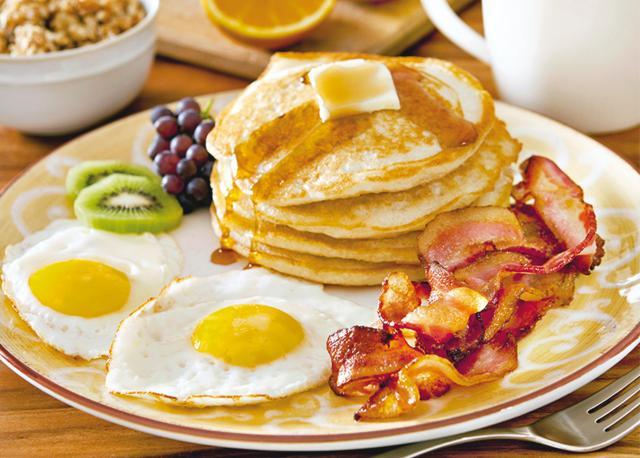
Each time I am in a hotel in the West and I look at the room service menu for breakfast options, I know, even before I have started reading, what the options will be. There will be a list of ways in which your eggs can be cooked (fried, scrambled, boiled, poached or an omelette; rarely is there any originality in the options) and a list of wheat products: waffles, pancakes, French toast. Because I avoid wheat as far as possible and recognise that eggs don’t really work as room service dishes (they congeal on their way from the kitchen) I find that I have zero attractive options. So, most times, I end up going down to the buffet where, at least, the eggs will still be runny.
Breakfast in the Far East is always so much more exciting. There will be congee on the menu. There is usually some kind of fried rice. Or perhaps some spicy rice noodles. It is certainly better than breakfast in France or Italy where everything tends to come from the bakery: croissants, sweet cakes, etc.
But in no country is breakfast as much fun as it is in India. I don’t usually have a very large breakfast when I am at home, but one of the joys of travelling is to eat the local breakfasts. If, like me, you are not a morning person, then don’t worry. You don’t always have to go out to get a great breakfast. Most Indian hotels will offer some (usually quite acceptable) variation of the local specialties.
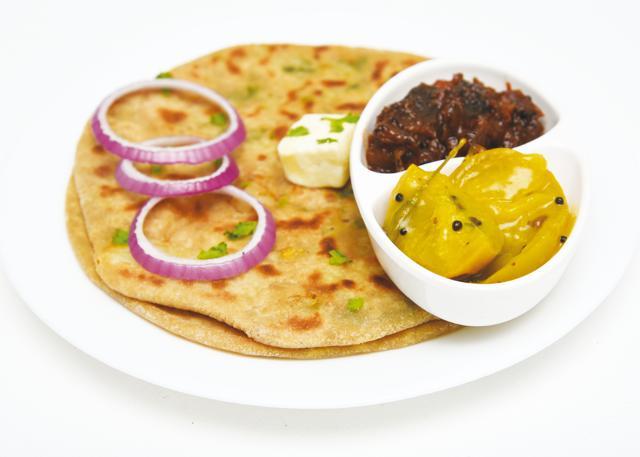
I have just come back from Jaipur where the kitchen at the ITC Rajputana turned out excellent breakfasts day after day. In keeping with my aversion to wheat, I began with wonderful bajra rotis, (more like our Kathiawadi rotlas) eaten with dahi and pickles or with an aloo sabzi but was tempted by the pyaaz ki kachori and the dal pakora; despite my aversion to wheat.
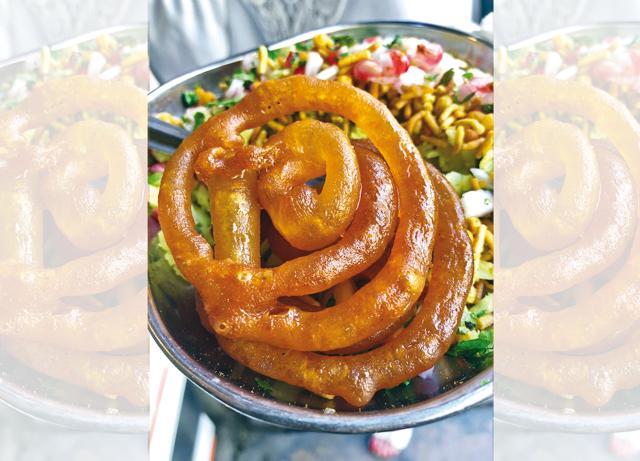
Rajasthan is just one of the many Indian states where breakfast can be the best meal of the day. In Punjab, the hot parathas, stuffed with gobi or aloo and eaten with pickles, are so substantial that you don’t really need to eat very much after that.
In Gujarat, we have such a range of breakfast dishes that you can go a whole month without repeating a single item. Some dishes, like dhoklas, are now universally popular. But our theplas (with garlic or with methi) are not as well known as they deserve to be. The popularity of the khakra does not extend far beyond Mumbai alas, though personally, I believe that its crisp texture makes it one of the great Indian breads. And then there are the rotlas, the khaari puris, the masala puris, the pudlas and the various other staples.
Or you can simply order in. A good farsan-seller will sell you hot jalebis and crunchy gathiya for a filling (if probably not entirely healthy) breakfast that requires very little effort on your part.
The kings of the breakfast market are, of course, the South Indians. At every hotel – whether in the North, South, East or West – the most ordered Indian breakfast items will be South Indian: dosas, idlis, vadas and upma. No hotel in India (even if it is in say, Amritsar or Kolkata) can survive without a South Indian cook because of the demands on the kitchen at breakfast time.
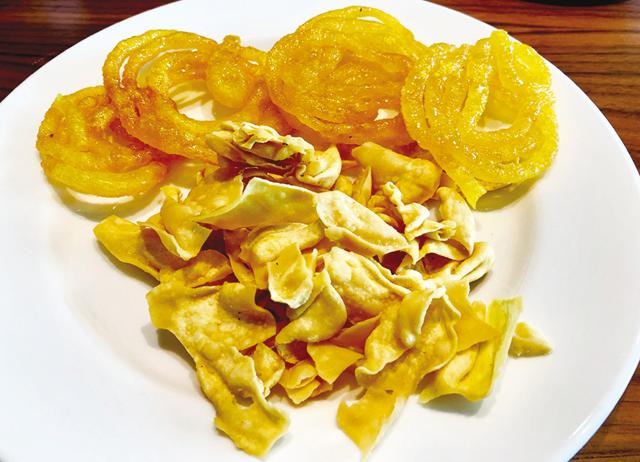
My default room service breakfast is a plate of idlis with podi (or chutneys) because dosas don’t travel well once they have left the pan and most hotels get the vadas wrong (too oily, all too often). But even with idlis, the success rate is seven out of 10. There will be at least three hotels where the idlis will either be leaden or too crumbly.
Obviously, rare is the hotel room service idli, which can compete with the classic version. And though I have done my share of waking up early and lining up outside MTR in Bengaluru or other such places, I now find that I am too lazy to get up at 7am to go out and eat breakfast.
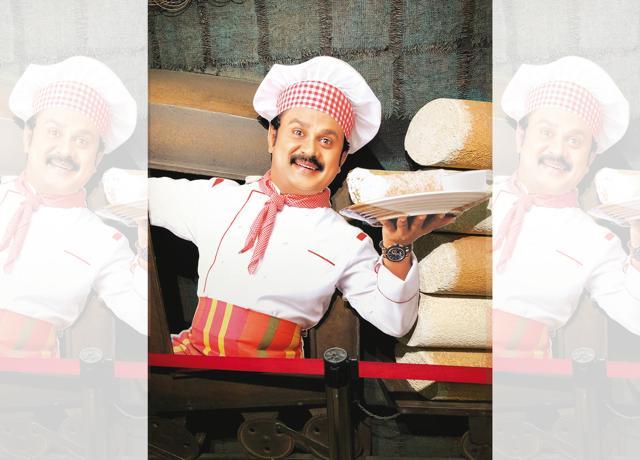
Though the idli is my default option because of its easy availability, the South Indian breakfast I really love is the Malayali breakfast.
My single most favourite Kerala dish is egg roast with appams. Now that I have eaten this combination at around 40 different places, I have got used to the variations: some egg roasts are heavy on the onions, some are wetter than others and some can be really spicy (which is not always a good idea, first thing in the morning). Malayalis like the idiappam, which I am not so keen on. And the Sri Lankan version of the appam, the hopper, sometimes comes with a fried egg on top, which I find delicious.
A more acquired taste is pittu (or puttu), which is probably the great Malayali breakfast. Pittu is not well-known outside of Kerala so let me explain what it is. The dish is hard to describe, but basically it consists of steamed cylinders of ground rice (rice powder), layered with coconut. You can have fillings on the inside but I like the classic version with Kadala curry, which is made from channa. I don’t know if it is the Gujarati in me but I find it tastes better (like all rice dishes) with poppadom.
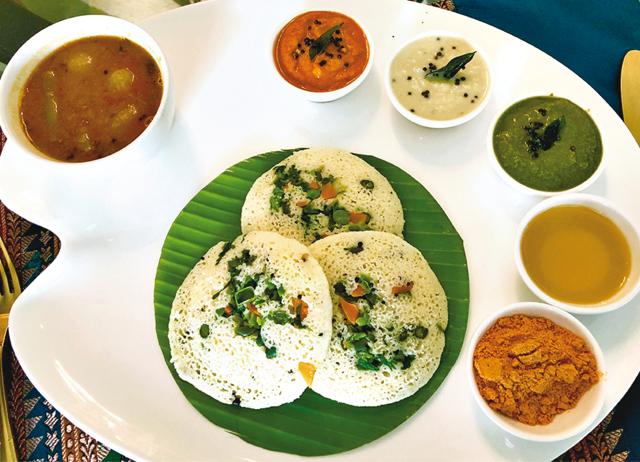
You can get fancier versions of pittu. Last year, I queued up for a table at Dhe Puttu, an extremely popular restaurant in Kochi, part-owned by the actor Dileep (whose photos adorn the walls) and was staggered by the many kinds of pittu on offer. So far, at least, I am sticking with the classic version.
Why are our breakfasts so much more adventurous than those in the West? Why do we have so many options when they stick to eggs day after day?
I haven’t been able to work it out. Perhaps it is because our schedules allowed us to start our days later. Europeans tend to have rushed breakfasts. (For some French people, breakfast means a cup of coffee and a croissant – or a Gauloise). And even the full English breakfast of legend (fried eggs, fried bread, fried mushrooms, limply-fried bacon, a couple of sausages and perhaps, a tomato) is rarely consumed by most people any longer. There simply isn’t the time for it.
It could also be that our breakfasts are more fully integrated with our other meals. Punjabis will eat parathas with every meal. Malayalis will eat pittu for dinner (otherwise Dileep’s restaurant would not be so difficult to get into), Gujaratis will eat bajra rotlas with every meal and in the South, the medu vada is an all-day snack.
In the UK and the US, on the other hand, breakfast dishes tend to fall into a distinct category. Eggs are hardly ever eaten as part of a main meal – they are seen as breakfast items. (The omelette is, arguably, the one exception.) Bacon is hardly ever eaten on its own outside of breakfast. Cereal is only eaten in the morning.
Perhaps because Westerners try and create a separate breakfast cuisine, they never fully exploit the potential of this wonderful meal. Or perhaps it is because they lack the imagination that we in India demonstrate by creating such excellent breakfasts.
I don’t know which one it is. But, push me to a wall, and I’ll go with the second explanation!
From HT Brunch, September 1, 2019



